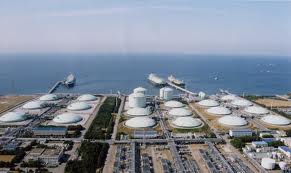The Energy Department on Friday conditionally approved a Texas company’s proposal to export liquefied natural gas, only the second such project allowed to move forward amid a production boom that has led to glut of domestic natural gas.The action would allow Freeport LNG Expansion L.P. to export up to 1.4 billion cubic feet of liquefied natural gas per day from its terminal near Freeport, Texas, south of Houston. The DOE said granting such a permit for shipments to countries that do not have free trade agreements with the U.S. was in the public interest.
Freeport is the second export project to win Energy Department authorization, following the Sabine Pass LNG Terminal in Cameron Parish, La.
Energy companies are seeking federal permits for more than 20 export projects that could handle as much as 29 billion cubic feet of LNG a day. If approved, the resulting export boom could lead to further increases in hydraulic fracturing, a drilling technique also known as fracking that has allowed companies to gain access to huge stores of natural gas but raised widespread concerns about alleged groundwater contamination and other problems.
A drilling boom has lowered natural gas prices while boosting production by one-third since 2005. Natural gas production reached an all-time high of 25.3 trillion cubic feet last year, according to the U.S. Energy Information Administration.
In recent months, however, production has begun to level off as the glut of natural gas keeps U.S. prices down. In response, producers have begun pushing to export the fuel to Europe and Asia, where prices are far higher. Approval of all the projects currently under review by the Energy Department could result in the export of more than 40 percent of current U.S. natural gas production.
The gas would be chilled to liquid form before being exported aboard large tanker ships.
Marty Durbin, president and CEO of America’s Natural Gas Alliance, an industry group, called approval of the Freeport project a positive step, but said the Obama administration should “pick up the pace of approvals so that the markets can decide which projects go forward.”
Durbin and Michael Smith, CEO of Freeport LNG, said expanded natural gas exports will help create jobs and stimulate the economy, while improving the U.S. balance of trade.
Consumer groups and some manufacturers that use natural gas oppose expanded exports, saying they could drive up domestic prices and make manufacturing more expensive. Many environmental groups also oppose LNG exports because of fears that increased drilling could lead to environmental damage.
In a statement that surprised some observers, Dow Chemical Co. said the long-delayed approval of the Freeport project “provides the greater clarity and certainty that businesses need to make investment decisions.”
Michigan-based Dow, which uses natural gas to power its plants and make products ranging from plastics to pharmaceuticals, has argued against unfettered exports, saying that could lead to price spikes that could harm the U.S. economy.
George Biltz, a Dow vice president, said Friday that the company does not oppose all exports, but has called for a “balanced” approach that weighs the benefits of specific projects against increased manufacturing costs and other factors.
Dow is a limited partner in Freeport LNG Development LP. Freeport Development owns an existing LNG regasification terminal at the site and is parent company of the proposed export terminal. Other limited partners include Freeport CEO Smith, as well as Zachry American Infrastructure and Osaka Gas Co.
As a limited partner, Dow has no role in Freeport’s day-to-day operations, Dow spokeswoman Nancy Lamb said Friday. Dow has not invested in the export venture “and will not invest” in it, Lamb said. Source: UNB




